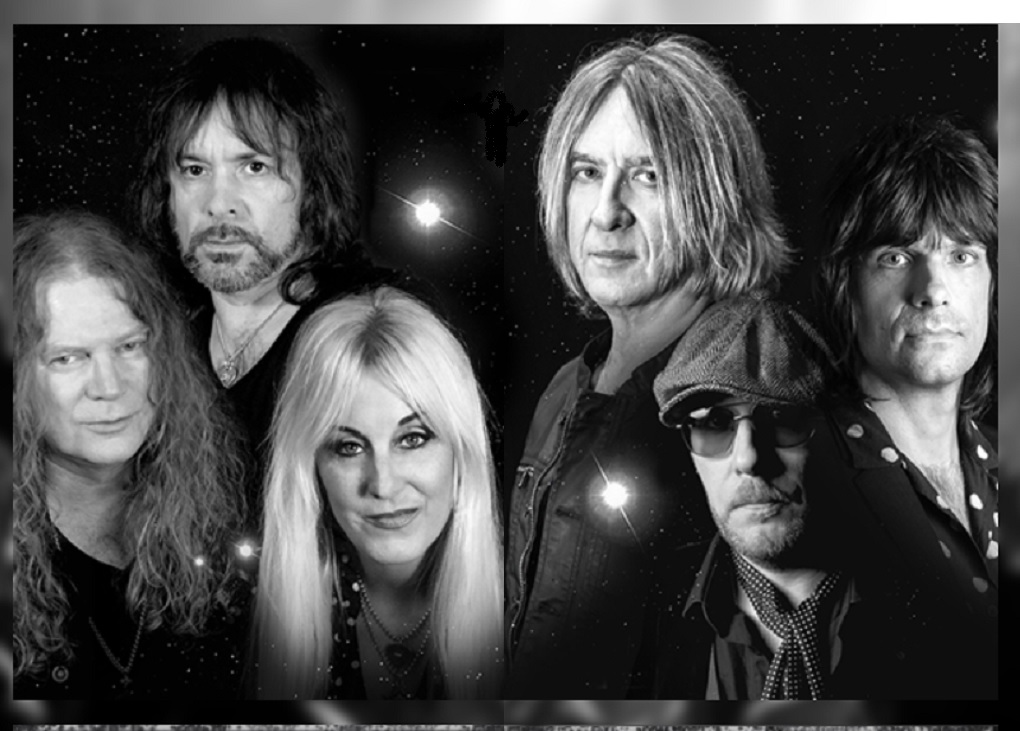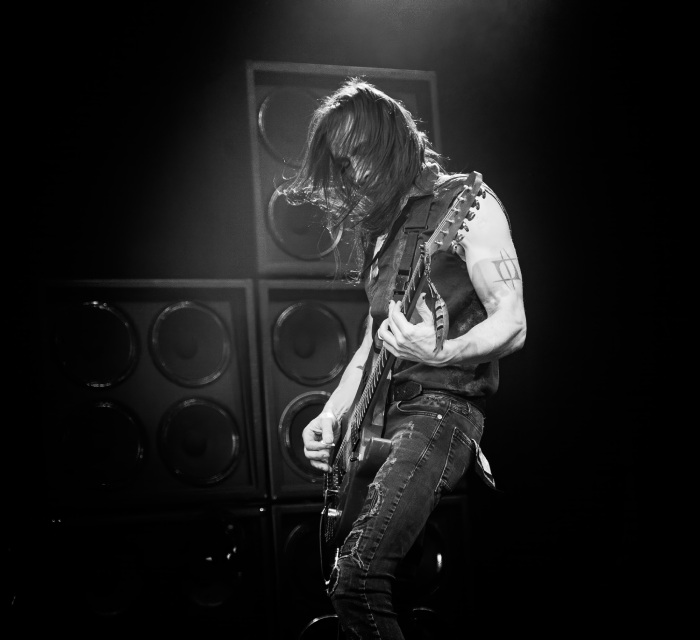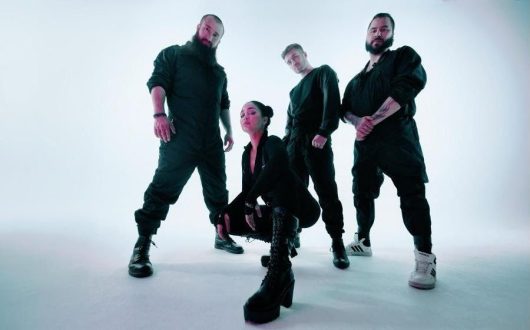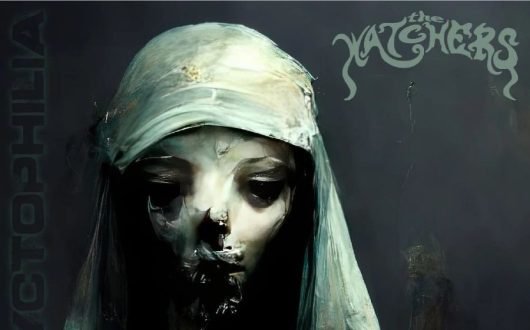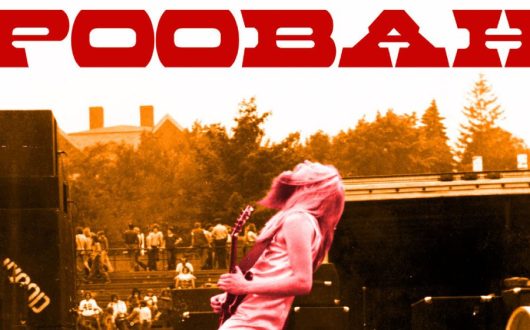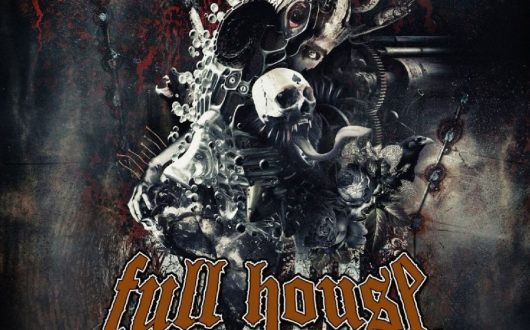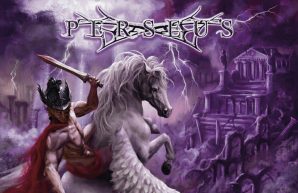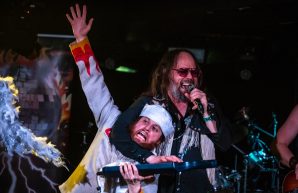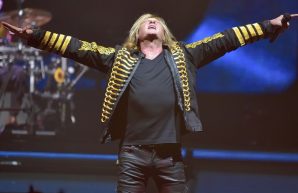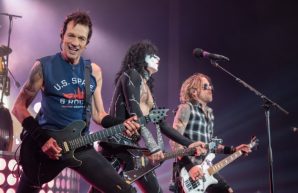Interview by Adrian Hextall
Down ‘n’ Outz, the project headed up by Def Leppard frontman and 2019 Rock and Roll Hall of Fame Inductee Joe Elliott, released their third studio album this month.
The band, competed by The Quireboys Paul Guerin (Guitar), Guy Griffin (Guitar) and Keith Weir (keyboards), plus Share Ross (Bass, Vixen) and Phil Martini (drums, Wayward Sons), take a different approach on “This Is How We Roll” to previous albums. The album only features one cover version (The Tubes “White Punks On Dope) alongside eleven original Joe Elliott penned tracks.
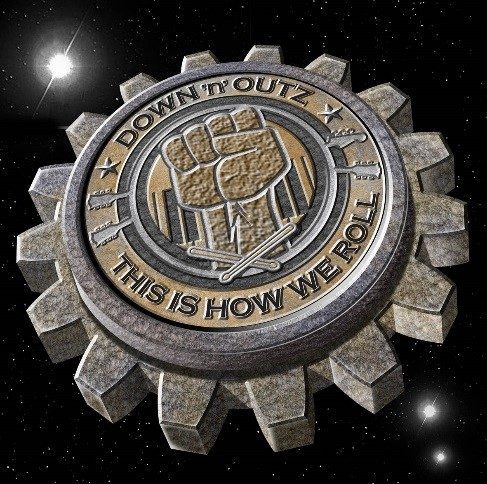
To get the lowdown on the new album and Joe’s plans for the band, we spoke to the man himself when he found 30 minutes of downtime in the States whilst out on Def Leppard duties.
AH: You’re over in the States at the moment then – Leppard related work I assume?
JE: I am at the moment, yes. I’m coming back in about a week’s time. I’ve got a lot of promo to do for this Down ‘n’ Outz album, but we’re just finishing off some stuff over here.
AH: Presumably coming back with a mind to do in a few live shows with the guys in Down ‘n’ Outz as well then?
JE: Eventually, that’s the plan but I’m blocking off– I’ve got one of these calendars with the big squares for each day with red lines to each one where the other guys aren’t available because their, as I like to call it, mother ships are busy. It’s looking increasingly difficult anytime soon, but we certainly are not ruling it out because things happen. Overnight, things get cancelled or changed and stuff, you know? But it doesn’t look like it’s possible anytime soon. But yeah, the whole idea is to play some live shows I’m just not sure when yet.
AH: If there was ever a right time to do some live work with the band it’s now because of course, it’s fresh material, isn’t it? It’s brand new music…
JE: Well yes, it is I agree, but I also believe as well because of the nature of this record and the way that the music industry is now. We put this out now on the 11th of October and if we didn’t do our next show until say, some summer festivals (the band last played together in 2014), I don’t think it’s going to hamper the record sales or hinder them or help them. I think it’s just the two separate things. The music industry used to thrive in the 80s and the 70s when you would put the album out and tour it to promote the whole thing.
This day and age, you actually put records out to promote tours or you just put records out because people want to buy the vinyl version of it, I mean, I’ve got mates that buy vinyl, they don’t even take the cellophane off they just put them on the shelve to say that they’ve got it, you know? [laughter] I never saw the point myself but there you go…
I think the fact that we’ve got the record finished, we’ve got a song at radio at the moment [the title track] which it’s doing all right on the radio, both sides of the Atlantic. In fact, it’s top five on American airplay radio at the moment.
AH: What does it mean to be part of Down ‘n Outz?
I’m well aware that this is a side project, and then as much as I’ll talk myself to death about these projects, we all know it can’t possibly compete with Def Leppard or anything like that. So, it has to be standalone to be taken for what it’s worth, which is, I like to think a great record that will stand up by being played on people’s stereos at home, you know what I mean?
AH: I can understand that. It’s interesting how you refer to it as a great album…. I’d like to think it as a great rock and roll record because from the off that’s what it feels like. It’s got that real rock and roll buzz to it, hasn’t it?
JE: Well, I think so because when you’re given the opportunity to do something like this where it’s not a solo record but it’s comparable to say Tom Petty and the Heartbreakers or something like that where it’s a band but there’s an obvious leader if you like. When this thing was put together back in 2009, it was me that was approached to do it. I was volunteered to work with the then line up of The Quireboys and we’ve obviously adapted somewhat over the years but it’s at least settled now with the line-up that we have.
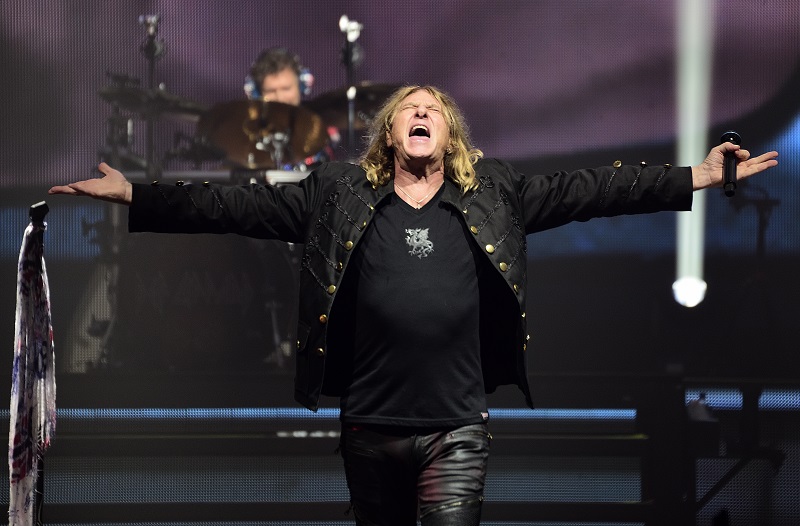
You know what? When you write a certain way for a band with certain people but at the same time as you do it now in the back of your mind or just on time-off or when– just downtime. You start playing with ideas that don’t necessarily fit, I hate the word format…[laughter] But they don’t fit the supposed format of another thing that you’re working, so, if I sit down at the piano and write a bunch of songs which is what I did for the Down ‘n’ Outz, I know it might ¨Ha-ha-ha’s¨ no matter how much I plead on my knees that these are Def Leppard songs, we all know that they’re not, you know?
So, it gives you that opportunity to do something different the same way that the Traveling Wilburys made it work, and they didn’t sound like ELO, The Beatles, Tom Petty and the Heartbreakers, Bob Dylan, it’s kind of a hybrid of everything, you know?
AH: Yes.
JE: So, when I did it, when I was put in this project together these were all my ideas of how I wanted to portray this particular aspect of my songwriting and it is a very rock and roll record it’s just the difference, the blinding difference between, say, Leppard and the Down ‘n’ Outz, it’s the piano. Because it’s still got drums, bass and guitars, and vocals, and backing vocals, they’re just applied in a very, very different way. As different as when people keep lumping us in with certain other bands we sound very different to them even though it’s the same instrumentation.
You can take any band that’s got two guitars, bass, drums, and vocals, and say, ¨Well they must be the similar.¨ but then you’re looking at The Rolling Stones and Iron Maiden, and they’re not similar at all. They’re very good at what they do but you can’t say that they sound the same.
Apart from the fact that Maiden has actually got three guitarists. [laughter]
So with this! With this particular project, again a very– another very grown-up word that I’m not too keen on, but with this band I just saw an opportunity to do things where you worked sitting around in a situation where you know upfront the reaction you’re probably going to get from an idea you put forward. So, if you come up with something that sounds very Def Leppard I play to the guys in Leppard, and they’ll go, “Oh yeah, that’s great.” and if you put something forward that doesn’t sound like Leppard they will have to sit and really consider, “Is this a direction that we’re able to go with?” and that’s something that happens to all four of the main writers in Leppard that sometimes they’ll put something forward and it takes the bravest one of you to go, “We could do this!”
With this, I didn’t have to go through that because I played the demos to the guys and when we were shooting the video for ¨Rock & Roll Queen¨ back in 2014, I had at least half of them written by then. We were listening to the demos of it while we were just getting changed and between shoots and stuff, and they were all like going, ¨These songs are great! There’s nothing, we don’t need to do any– you can put them out as they are!¨ so, yeah, but then they would be a Joe Elliott solo record, so, I want this to be a band, so I’m like, “Hey, we’re in!” So, there wasn’t much, what we do is zero changing of the actual songs from the demos, there was– the arrangements would stay the same, the lyrics and melodies, keys, etc… tempos, there were all deciphered– and they were just happy to just get you a band and play it.
They are all much much more than just session men, but– because it wouldn’t have sounded as good have they not played on it, if I’d had just brought in people that were competent players. I wrote these songs with their abilities in mind, so I knew that Keith could really handle the piano playing better than me and Paul would pull out some amazing solos over the spaces I had written for him to do that. I was very confident that we had this situation where we were going to make this great rock and roll record, as you call it.
This album is a reflection of my lifelong fandom of rock for a kid listening to Bowie and Bolan and T-rex and all those bands, Queen, Sparks. You can hear little bits of Elton John, Leon Russell. You can hear little bit of their catalog in these songs because that’s what influenced it.
AH: The album does feel like it probably represents the true sound of what’s always inspired you. It’s a mash up of all of those artists that you grew up with, as you say, you were inspired by and you’ve never necessarily had the opportunity to say, “Here you go, this is the list, this is me, this is Joe Elliot and this is all my love of music.”
JE: That’s absolutely right because what Def Leppard is when it started out I was a huge music fan that could just about plunk out a tune on a rhythm guitar and write a lyric and what have you.
But as an 18-year-old kid, when you join a band, I had a choice of 10 different groups of four people to join. We just drifted together, and we just became that kind of heavy rock band. And I wasn’t about to go in on my second rehearsal go, ¨This isn’t right guys, we need to get a piano player and start trying to dictate how it sounded. [laughter]
It didn’t matter whether they were pop rock or full-on rock or whatever. It is what it is, and you contribute to that democracy to that cooperative that five people are. Def Leppard like most great bands including The Beatles, they compromise. There were things that McCartney had to do that he wasn’t fond of but Lennon was and vice-versa. So that’s what you do when you are in a band and you find a happy medium and you get there in the end. That’s what it’s like being in a band. It’s not as difficult as that might sound and it’s not as easy as you think so it’s somewhere in the middle is what a compromise is or a democracy, and it works perfectly for us, because we were all on the same page 99 times out of a 100 so, I’ve no complaints with that at all.
But, isolate any one of us into a room and say, ¨Okay, you can now forget your relationship with the other four guys.¨ What’s the real Phil Collen? What’s the real Rick Savage? What’s the real Joe Elliot, you know?
AH: Yes.
JE: And you get vastly different things, I mean, look at our solo projects – When Phil [Collen] started doing Manraze he got back together with Simon [Laffey] from Girl on bass and Cookie [Paul Cook] from the Sex Pistols. With Cookie you know you’re going to have a weird hybrid there and it turns out that he was doing like roots, rock, reggae, pop. It sounded like The Police. It didn’t sound anything like what we were doing. When Vivian [Campbell] does Last In Line, it sounds more like Dio than Leppard, of course.
And when I do it at Down ‘n’ Outz it sounds more like Mott or Elton or Queen or Sparks or whoever, Roxy Music, than it does Def Leppard because that’s our individual DNA, not our collective. So it’s the perfect thing when you isolate yourself and you go, ¨Okay, now it’s 100% what I want to do.¨
You don’t have to run it by anybody, as I mentioned earlier. I did at a– just a loyalty fact that it’s being in Leppard for 40 years. You don’t just dictate. I’m not that kind of guy. I rather pass things by everybody in the band, and they were all like, ¨Yeah, I’m in!¨ [laughter] So, it is, that is a situation where it really truly is no compromise in that respect. I wrote to what I felt and if it was vastly different to what I’ve done in the past, that’s exactly what it was supposed to be.
JE: Yes I am! I play the piano in all the demos and what we did, because the demos are recorded in my studio they were exactly demos in the sense of, I think we’re all programmed to believe that demos are tinny, hissy, low quality four track things that you go in and re-record. In this day in age what we do in my demos is I put the songs together. I did them in such a way that– to make sure that they worked with my voice so that the tempos on the keys was spot on. And then we fill them out so when we came to record the album we literally just painted over the top of my demos. So, I sent the tapes with the programmed drums over to Phil [Martini] in London, and he played the drums over the top of my demo, and I didn’t give him any specific instructions other than he said, ¨How do you want me to do it?¨ I said, ¨I want you to be you, just play whatever you think if you have to play all the fills the same, you go your own way, just give me four takes of every song from mild to manic so that we know we’ve got every aspect covered– of the dynamism that we needed within the songs.¨
And then we would piece that together like a jigsaw puzzle later on when we me and Ronan [McHugh – producer \ engineer] got the stuff back to our studio. Same thing when Share Ross recorded the bass. She recorded the bass pieces and just sent them back via the Internet to the studio, and we pieced it together and then Paul, Griffin and Keith came over, and they literally wherever they were doing Quireboys gigs and say, ¨We’ve got a week off.¨ and I had a week off I said, ¨Right, we’ll come and do Tuesday, Wednesday, Thursday and then you can all go home.¨ and we would blitz as much as we could, and we did that three or four times, and we got the album back in track stored, and I think Paul came over one more time just to tidy up some solo work.
In many respects it was no difference to anybody else that makes a record other than we were all living in the same town. Because the songs where there. It was feasible to do it this way. It wasn’t that difficult. It’s not like it’s not real or it’s too messy. It was perfect. As regards to the piano playing, Keith has his own style and I have my own style. Mine is very rudimentary and his is a lot more skilled than mine but sometimes the rudimentary stuff is what makes it work. And so, on certain songs when it came to the crunch, when we did the mix, if something didn’t feel right to me I would say to Ronan, ¨Bring my piano demo up and let’s hear the difference between Keith and me.¨ So, on certain songs, maybe an intro of a song it’s actually my demo part.
And then it cuts to Keith when the vocal comes in because he plays that part better than I did, so, mostly it’s 90% him 10% me, which is why I jokingly put on the credits, ¨Joe Elliott ‘some piano’¨ because Bowie also wrote that on Hunky Dory, because he did play some piano but it was mostly Rick Wakeman.
AH: Right, I like that, that’s a nice touch.
JE: So, yes! That, but I mean, I’d never seen a piano until Def Leppard went to Starling’s Studios at Tittenhurst Park to record On Through the Night in December of 1979. But I sat on the stool and started just blaring out this record and doing the rundown that you did on many of those 70s songs and I just started working on it, and working on it, and working on it, and I started taking it very, very seriously once I’ve been challenged to play Love Lies Bleeding by Elton John.
At my mate Dave Kilner’s memorial show [The former DJ died aged just 48 and a memorial show called ‘Dave Kilner – A Night to Remember’, was organised by his wife Shirley and the couple’s daughters Rebecca and Nicola] in 2011 thank God Shirley, his widow, said, ¨There’s four and a half months before the show.¨ and I said, ¨You got to be kidding me! This is an 11-minute epic!¨ but I send her the piano with a tape of the song and I just kept going over and over and over it, and we pulled it off as a band in the version. I don’t know if you’ve ever heard it, it’s out there on YouTube but the version that we did in the Sheffield City Hall it’s a brilliant version. Elton loves it. And when I was doing it, I had three members of Kiss over my shoulder because they were in the hotel next door to the City Hall so, no fucking pressure then.
AH: [laughter]
JE: But once I figure I can get to a Love Lies Bleeding I said, ¨You now can get to anything.¨ apart from probably Rick Wakeman’s style YES stuff.
AH: Just in the last couple of minutes that we’ve got. You mentioned about, obviously, using the piano playing to get the melodies and whatever to suit your vocals. It’s not like you’ve sat back on the vocals side because you’ve pushed yourself. I mean, listening to something like Boys Don’t Cry, you’re pushing your voice quite hard aren’t you? To get some of the high notes there, it’s not just a sit back and sing a rock song.
JE: The rock stuff, I’ve never been a quiet rock singer, you know what I mean? There’s a high section in a song called Walking To Babylon which is definitely pushing myself the two part, I mean, that’s me and me.
AH: Yes.
JE: Yes, Boys Don’t Cry is a bit Jagger-esque, I think, it’s a lower key but its still got balls to it if you like.
AH: Yes.
JE: And it’s the same thing with the opening track, Another Man’s War,. That’s me really giving it somewhat. I didn’t want it to be totally perfect. I wasn’t looking for a perfect performance on the opening track. I wanted it to have a bit of grit and a bit of vulnerability. I definitely wen’t to town for– I wouldn’t call it perfection but I wanted a really good performance on like, Last Man Standing, because of the nature of the song.
AH: Yes.
JE: When you got that brilliant intro piano part and that lyric of, ¨God took an axe on my family tree.¨ I really needed it to sound– would it grab people’s attention not just from a lyrical point of view but from a performance point of view. So, I certainly didn’t write this to be easy on myself I just wanted it to work and if you are singing over a piano, you’re not going to sing in the same voice that you would sing over, let’s say, the backing track of Rock Of Ages.
AH: Yes.
JE: Because they’re two totally different voices. I’m lucky that I have different voices within my limited range that I have. Well it’s actually it’s a four octave range really, but, I’m more of a portrayer of a lyric than a singer in the sense of Lou Gramm or Paul Rodgers. I’ve never had that kind of voice but the way that Ozzy or Ian Hunter, Alice Cooper or Gary Holton could portray a song, even Mick Jagger,. They’re what you call classic singers, but they don’t all have a great voice.
AH: Oh, yes, absolutely.
JE: And I wanted to be able to get across all aspects of what I’ve got going depending on the kind of song that it was, so yes! On certain songs there’s definitely a lot of going for it if you like and on other stuff is a bit more restrained.
AH: That was the thing that really sort of made it for me. I mean, I’ll be honest, the first thing I wrote when I was listening through it was, ¨You have me at piano.¨ Because to be honest, you did, it was the thing I just loved about the whole album was the piano work. But then hearing your voice work with this as well totally different approach for me and totally away from what you do normally and you have done for the last 40 odd years, so, thank you very much for that because I’m enjoying it!
JE: Yes, which is great stuff. I think it’s still recognizable as me, the same way that if you hear Ozzy Osbourne. If you blind test it, a voice over backing track that sound like Black Sabbath or the London Philharmonic Orchestra within about three words you go, ¨That’s Ozzy.¨
AH: Yes.
JE: Because his voice is so recognizable that it’s him but you take a song like, say, Goodnight Mr Jones where it’s just piano and strings and very Life On Mars-esque backing track and a lower key vocal because it’s a bag in the words it costs. It still sounds like the stuff that I’ve done in the past on maybe, I’m thinking a slower Leppard stuff that’s maybe lower key, latter day ballads or even things like Foolin or Bringin’ On The Heartbreak.
You can check out the new Down ‘n Outz album now from all the usual outlets:

